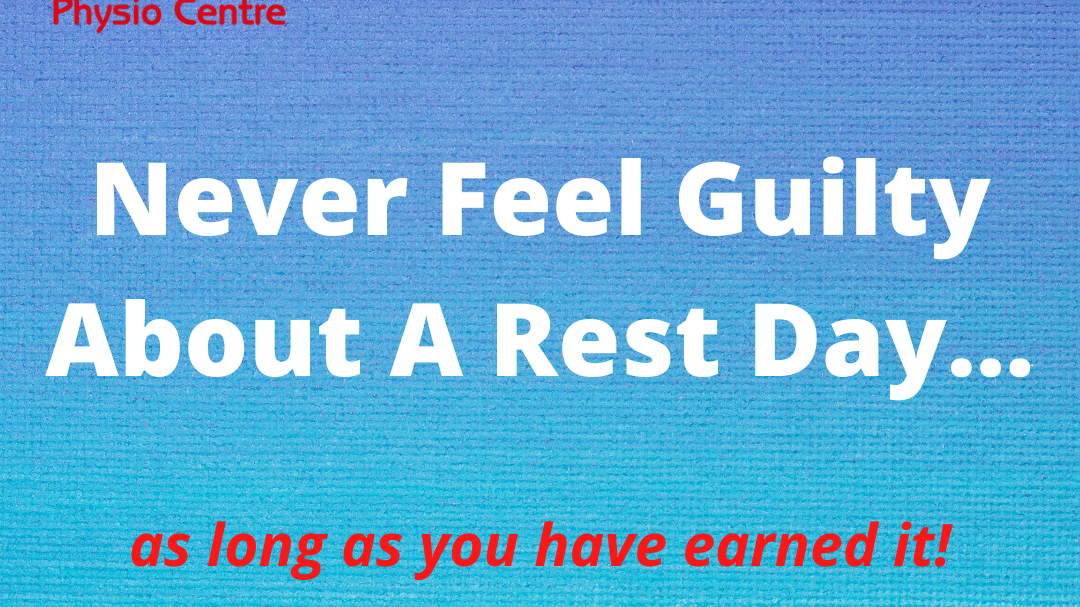
“I’ve just finished my 27th day in a row of training” my patient says proudly, expecting (I think) an excited and encouraging reaction from me! But as the alarm bells start to ring loudly in my head, I need to think quickly to give the appropriate response – one of excitement and encouragement (because it really is a great achievement) but also one that is a fraction tempered, or at least educational, because with every consecutive day in a row of vigorous training we become a day closer to potential disaster if the body doesn’t get the recovery it needs to keep performing.
This story reminds me of the patient I had many years ago who had completed 100 push ups and 100 sit ups for almost 2 years in a row, and despite aching shoulders and a sore back continued this quest, too caught up in the numbers to realise that what he was doing was actually creating potential longer-term issues in the process. But our access to numbers and data and apps means we are often slaves to these numbers, adding up days or kilometres or speeds that we have completed, driven to keep adding to the numbers because it sounds good, and it certainly looks great when you look back at the data over time.
It seems that it is very hard to change the general perception that a day off is a lost day. Psychologically, it is very hard for many people to have a day off training or exercise, especially when training with a target or event in mind. “More must be better” is the catch cry. I have been through in previous blogs one of the most important research papers of recent times, the one by renowned sports scientist Tim Gabbett, where he explains the need to train SMARTER and HARDER! Just training harder with no reference to smarter is probably going to get you injured.

So why is it that people find it so hard to accept that a day off might be a good day? I honestly feel that the issue lies in the brain processing what you are NOT doing – you are NOT adding days, or sessions, or kilometres to your never-ending stream of recorded data. And that can hurt if your sole focus is data! What you should be looking at is what you HAVE done: you HAVE rested, you HAVE recovered, you HAVE freshened up, and you WILL be more ready to keep training hard, and keep that volume flowing, and keep your performance levels improving.
Let me give a bit more of an extreme example to illustrate what I mean. Imagine you are training for the famous Camino de Santiago pilgrimage walk in Spain (which a number of our clients have completed over the years), a journey that may involve 1000km of walking over 4-5 weeks. So you’ve just done your 27th day straight of walking; you: definitely proud – me: definitely worried! Why am I so worried – because the body does not like repetition, it does not respond well to the same loads, day after day. If you are this person training for the Camino, what do you do – you walk…and you walk…and you walk! Day after day. The same loads, the same speeds, the same surface, the same backpack – get the drift? There’s no way you will be doing the same speeds, surfaces, distances on the Camino! Even just variable speeds and surfaces are like a semi break for those tissues compared to the same repetitive loads in training and preparation.
Obviously the above is an extreme example – I think driving 1000km in a month is hard work, let alone walking it! But it doesn’t matter whether you’re a Camino walker, a distance runner, a swimmer, a gymnast. If you train with basically the same routine every time you train, you are not only at risk of injury, but probably even more importantly you aren’t going to reach your peak potential. Do you know that many elite marathon and ultra-marathon runners (who run sometimes hundreds of kilometres at slow speeds) have speed sessions in their training regime? Not only to break up the stress on their body’s, but to improve their performance. Variation is key to injury reduction and performance enhancement!
Let me define “day off” also, as it appears in the title of this article! A day off may be anything from a complete rest day (yes, just deal with it all you data fanatics) to simply being a day off your normal routine: if you swim for general fitness and do freestyle every session, try some backstroke every now and then; if you’re a bike rider try some swimming; if you’re a runner try some gym. Just break up your normal routine and “have a day off” by doing something completely different.
But also, don’t forget that a complete day off is brilliant. Let your body rest – mentally and physically. If all you like to do is run, that is fine -just don’t do the same run at the same speed every single session. Have a day off from it and try something different! And don’t forget to put some effort into your sleep patterns too, especially the deeper and harder you are into your training regime. You can work on your sleep (our best recovery tool) every day, you only need to work on a day off every now and then!
Perhaps in the next article I might focus on the people like me who have taken the “day off” benefit to the extreme, and now need some motivation to actually focus on the “day on”!
Anthony Lance
SSPC Physiotherapist
You might like these other resources
Are Your Bones Strong Enough?
28 May 2024
BEWARE YOUR SCAN RESULTS!
23 February 2023
STAY OUT OF THE BASEMENT THIS SUMMER
23 December 2022
Staying Healthy – The Missing Pieces Of The Puzzle
17 November 2022
So I Don’t Need A Knee Reconstruction Anymore?
8 September 2022





